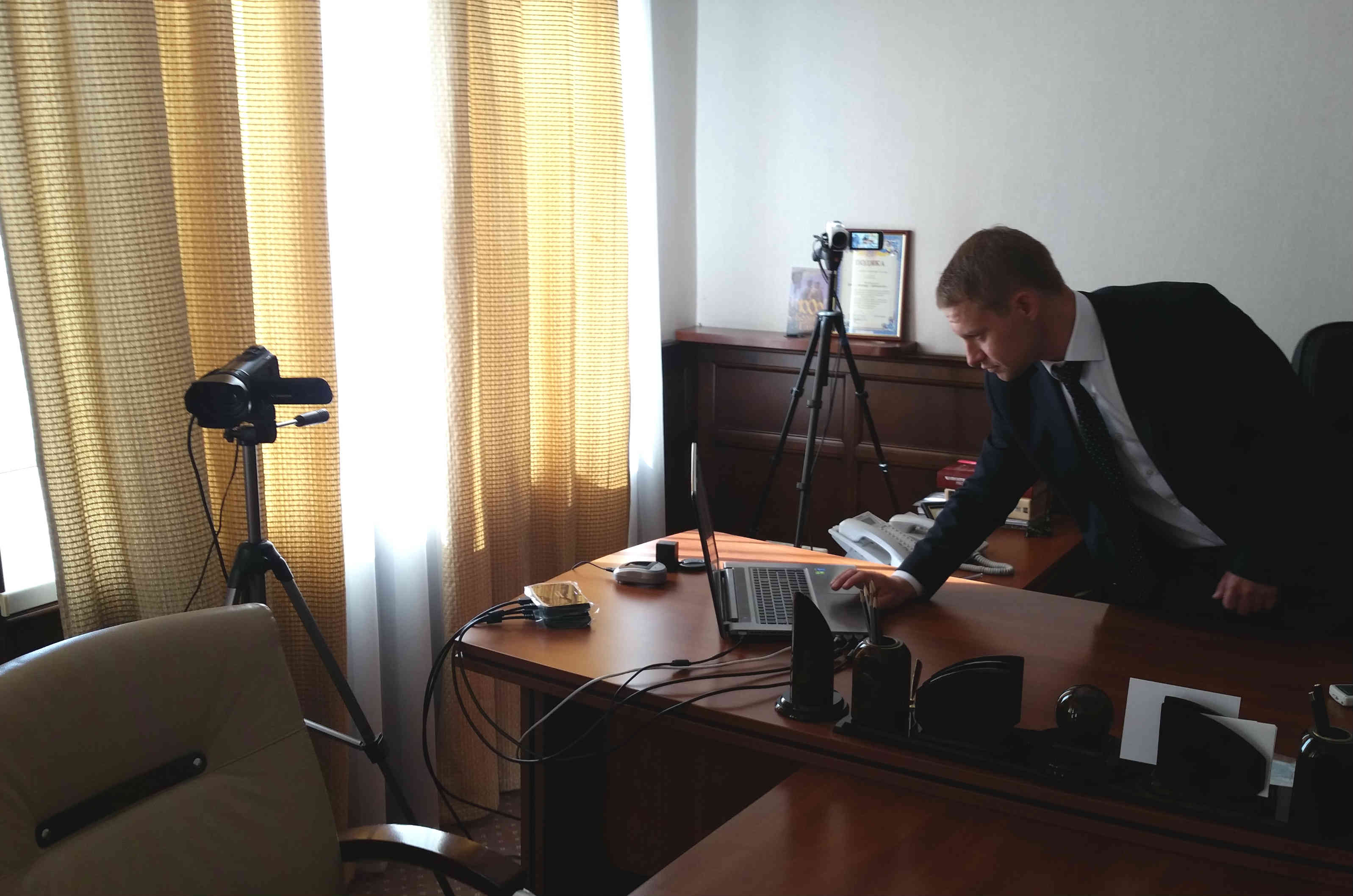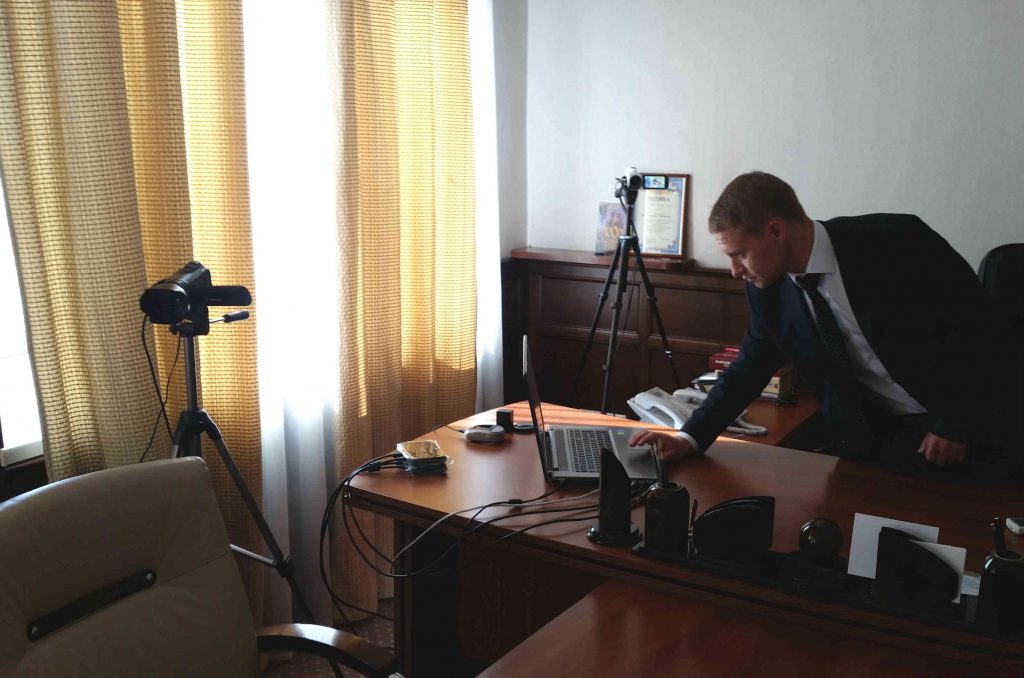 On Saturday, June 6, approximately 200 people gathered in the great hall of the Vyshhorod state administration building to welcome home 120 soldiers returning from the war in eastern Ukraine.
On Saturday, June 6, approximately 200 people gathered in the great hall of the Vyshhorod state administration building to welcome home 120 soldiers returning from the war in eastern Ukraine.
Vyshhorod District Head Alexander Gorgan presented certificates to those soldiers who had completed one year of military service, which entitles them to land, medical care, and preferential hiring. It was by all accounts an ordinary town-and-gown ceremony in Vyshhorod, a small city north of Kyiv.
But something was clearly different: Gorgan gave his cell phone number to local residents and encouraged them to contact him with their problems.
“People told him that his phone would ring all night. He said, ‘That’s what I’m here for,'” said William Taylor, who served as US Ambassador to Ukraine from 2006 to 2009. Taylor has known Gorgan for almost a decade. He recently visited Gorgan and observed the demobilization ceremony.
“Alex is one of the most idealistic people I’ve met…anywhere in the world,” Taylor said in an interview June 9.
On March 31, Ukrainian President Petro Poroshenko appointed the young reformer head of the Vyshhorod district, making him roughly the equivalent to a county executive in the United States. Rooting out corruption, both large and small, is a top priority for the Poroshenko government, and for Gorgan as well.
Gorgan, 40, is already getting noticed. His commitment to radical transparency takes the form of two video cameras he has installed in his office—one points at his desk, the other at his conference table. The cameras live-stream his every move on YouTube. Before he goes home at night, Gorgan posts the next day’s detailed agenda to his Facebook page. Every document he signs goes online. Gorgan uses Twitter to remind his constituents that they can watch his meetings. The district’s budget is also online.
“The level of transparency that you have with your cameras, with your agendas… is a model that is useful for the entire world,” Taylor said.
Gorgan’s efforts have already brought in more than 500,000 hryvnia in overdue taxes. He sits down with local mayors and businessmen who refuse to pay local taxes and demands compliance—for all to see.
His tough-guy approach shouldn’t surprise anyone. In 2014, he completed the Ironman competition in Frankfurt, Germany. The all-day contest includes a 2.4-mile swim, a 112-mile bike ride, and a 26.2-mile run that must all be completed within 17 hours. No breaks are allowed. Gorgan finished the Ironman in 12 hours, 27 minutes, and 11 seconds.
He has consistently applied that same Ironman spirit to his career. Gorgan is an attorney who left the profession because he couldn’t stand the bribery that was required to win cases.
“The corruption was so total that when you weren’t paying you were always losing,” Gorgan said in an interview June 10. He consistently lost in court because he refused to bribe the judge. His clients weren’t happy. Neither was he.
“It’s better now [after the Euromaidan revolution],” he said, but he enjoys the challenge of working with people and solving problems. “I’m doing real things.”
Residents have taken notice of Gorgan’s efforts. One of his first acts in office was to organize a weekly 120-kilometer bike ride with a police escort. Much of the country lacks bike lanes and cycling can be dangerous. Each Sunday morning, hundreds of bikers from Kyiv cycle through the district. The initiative costs the taxpayer nothing but puts the district on the map and conveys that the local government cares, he said.
Gorgan wants his region to be known as environmentally conscious and innovative. “We have to look like California,” he said.
He’s made efforts to clean up the forests in the district. Before and after videos show a dramatic change.
Next year, students in the district will have an opportunity to learn computer coding at school.
At the June 6 demobilization ceremony, Taylor asked several people about Gorgan’s radical measures. Some told him that they were shocked.
“I’m sure there will be skepticism… but as [residents] see that he’s serious about being wide open and see improvement in their lives… they will gradually come around,” Taylor said.
“They know exactly what I’m doing,” Gorgan said. “There’s no wall between me and the community anymore.”
Gorgan was deeply involved in supporting both the Orange Revolution and the Euromaidan protests. During the Euromaidan revolution he did a variety of tasks—from commanding a self-defense unit to working in the revolutionary kitchen in Kyiv’s Trade Unions building to creating a media campaign that urged the European Parliament and the United States to support Ukraine’s European aspirations.
He also did something unusual. When then-Ukrainian President Viktor Yanukovych fled Kyiv on February 21, 2014, no one knew his whereabouts for several days, or if he would attempt to return. Gorgan helped organize a race on the grounds of Yanukovych’s opulent palace to send the message that the Ukrainian people “will never give it back.”
“Victory is complete. This property belongs to regular people,” he said.
He previously served as a deputy on the Vyshhorod city council from 2005 to 2010. He ran for Kyiv city council on the same ticket as Kyiv Mayor Vitali Klitschko in 2014 but lost by nineteen votes.
Gorgan’s real challenges are only starting, though. Residents will expect him to apply the same grit and determination that saw him through the Ironman competition to a new test that goes far beyond a swim and a bike ride.
Melinda Haring is editor of Ukraine Alert at the Atlantic Council. Simon Hoellerbauer contributed to this report.
Image: On March 31, Ukrainian President Petro Poroshenko appointed Alexander Gorgan head of the Vyshgorod district, making him roughly the equivalent to a county executive in the United States. Rooting out corruption, both large and small, is a top priority for the Poroshenko government, and for Gorgan. Gorgan is committed to radical transparency: he installed two video cameras in his office, one points at his desk and the other points at his conference table. Credit: William Taylor.
